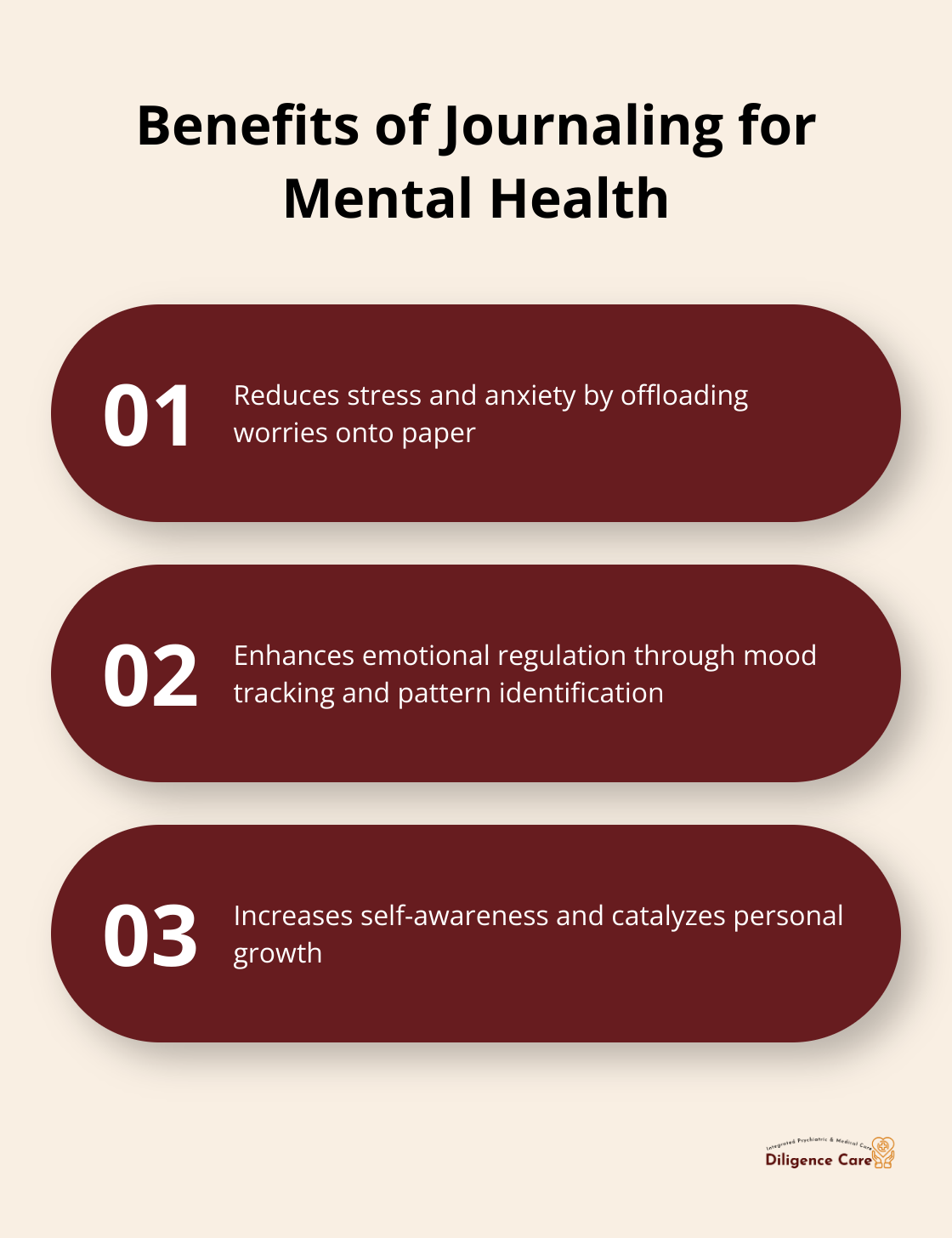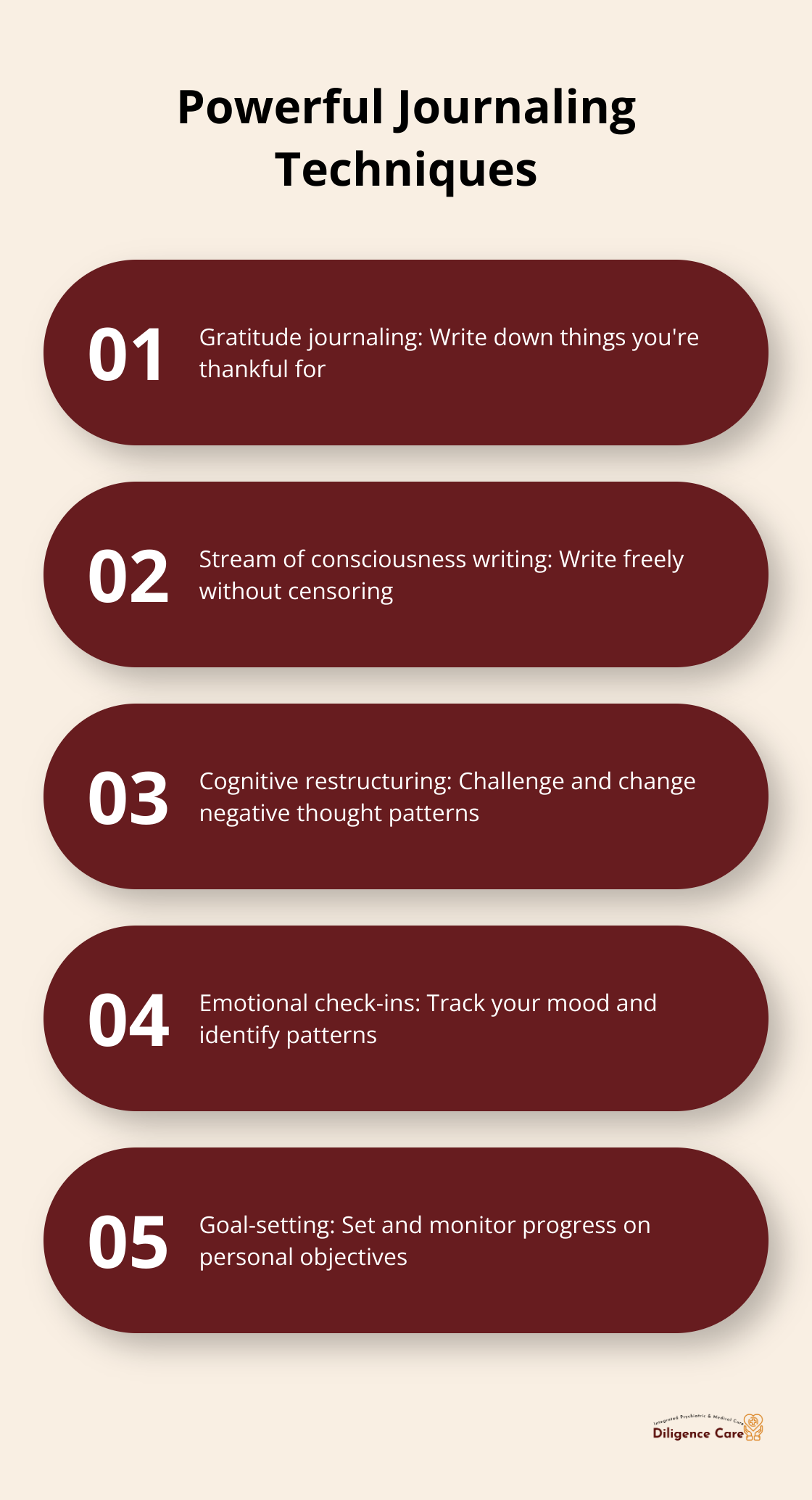
Mental Health Self-Care Journaling Techniques
At Diligence Integrated Care, we’ve seen firsthand how powerful journaling can be for mental health.
A mental health self-care journal is more than just a notebook; it’s a tool for personal growth, emotional regulation, and stress reduction.
In this post, we’ll explore effective journaling techniques and how to incorporate them into your daily routine for better mental well-being.
Why Journaling Transforms Mental Health
Journaling stands as a powerful tool for mental health self-care. At Diligence Integrated Care, we’ve observed numerous patients experience significant improvements in their mental well-being through consistent journaling practices.
Stress and Anxiety Reduction
Journaling functions as a pressure release valve for the mind. Writing down worries and fears essentially offloads them from your brain onto paper. This process often leads to immediate relief from stress and anxiety. A study found that those with various medical conditions experienced decreased mental distress through journaling about their feelings.
Emotional Regulation Enhancement
Regular journaling helps you become more aware of your emotional patterns. Tracking your moods and reactions over time allows you to identify triggers and develop better coping strategies. Dr. Bolanle Oluwadara, MD, at Diligence Integrated Care, often recommends journaling as a complementary practice to therapy for patients working on emotional regulation.
Self-Awareness and Personal Growth
Journaling provides a unique opportunity for self-reflection. As you write about your experiences and thoughts, you may uncover insights about yourself that weren’t previously apparent. This increased self-awareness can catalyze personal growth and positive change. Many patients report feeling more in tune with themselves after incorporating journaling into their daily routines (try to set aside 10-15 minutes each day for this practice).

Safe Outlet for Processing Thoughts
In a world where we often present a polished version of ourselves, journaling offers a judgment-free zone to express raw, unfiltered thoughts and feelings. This safe outlet can particularly benefit those dealing with complex emotions or traumatic experiences. Bernadette Akpengbe, PMHNP-BC, FNP-BC, has noted that patients who journal regularly often find it easier to articulate their feelings during therapy sessions, leading to more productive treatment outcomes.
Adaptability to Various Mental Health Needs
Journaling isn’t a one-size-fits-all solution, but its versatility makes it adaptable to various mental health needs. Whether you’re dealing with anxiety, depression, or simply looking to enhance your overall well-being, incorporating journaling into your self-care routine can yield significant benefits (even just 5 minutes a day can make a difference).
Now that we’ve explored the transformative power of journaling for mental health, let’s examine specific journaling techniques you can start using today to improve your mental well-being.
Powerful Journaling Techniques for Mental Wellness
At Diligence Integrated Care, we’ve discovered specific journaling techniques that boost mental health. Let’s explore some powerful methods our patients find particularly effective.
Gratitude Journaling: Shift Focus to the Positive
Gratitude journaling involves writing down things you’re thankful for regularly. This simple practice can profoundly affect mental well-being. According to research, gratitude is associated with improved mental health, including decreased levels of stress and sadness. Dr. Chijioke Iwuchukwu, MD, often recommends patients start their day by listing three things they’re grateful for. This technique helps shift focus from negative thoughts to positive aspects of life, potentially reducing symptoms of anxiety and depression.
To maximize benefits, try to be specific in your entries (instead of writing “I’m grateful for my family,” write “I’m grateful for the supportive phone call I had with my sister yesterday”).
Stream of Consciousness Writing: Unleash Your Thoughts
Stream of consciousness writing involves putting pen to paper (or fingers to keyboard) and writing whatever comes to mind without censoring or editing. This technique can help process complex emotions or work through challenging situations.
Bernadette Akpengbe, PMHNP-BC, FNP-BC, suggests setting a timer for 10-15 minutes and writing continuously until the time is up. Don’t worry about grammar, spelling, or even making sense. The goal is to let your thoughts flow freely. This practice can reduce mental clutter, increase self-awareness, and often leads to unexpected insights.
Cognitive Restructuring Through Thought Records
Cognitive restructuring is a powerful technique for challenging and changing negative thought patterns. Regular journaling allows individuals to develop a habit of self-reflection, emotional processing, and cognitive restructuring, which can lead to long-term benefits. We often use thought records as a journaling tool to facilitate this process. Here’s a simple format you can try:
- Situation: Describe the event that triggered negative thoughts.
- Automatic Thoughts: Write down the immediate thoughts that came to mind.
- Emotions: Note the feelings associated with these thoughts.
- Evidence For: List facts that support your automatic thoughts.
- Evidence Against: List facts that contradict your automatic thoughts.
- Balanced Thought: Create a more balanced, realistic perspective based on the evidence.
This structured approach helps you objectively examine your thoughts and develop more balanced perspectives. Dr. Bolanle Oluwadara, MD, has observed that patients who regularly use thought records often report decreased anxiety and improved mood over time.

Emotional Check-ins and Mood Tracking
Regular emotional check-ins and mood tracking can provide valuable insights into your mental health patterns. Try to dedicate a few minutes each day to jot down your current emotional state and any factors that might have influenced it. Over time, this practice can help you identify triggers, recognize patterns, and develop more effective coping strategies.
Goal-Setting and Progress Monitoring
Use your journal to set and track personal goals. Write down specific, achievable objectives and regularly document your progress. This technique can boost motivation, increase self-efficacy, and provide a sense of accomplishment as you work towards your goals.
Effective journaling is a skill that develops with practice. Start with the technique that resonates most with you and gradually incorporate others. As you explore these journaling techniques, you might find it helpful to combine them with other self-care practices. In our next section, we’ll discuss how to seamlessly incorporate journaling into your daily routine for maximum mental health benefits.
How to Make Journaling a Daily Habit
Find Your Ideal Time and Space
Journaling is beneficial for mental health because it provides an effective outlet for processing emotions, which can lead to reduced anxiety and stress. Many patients find success by journaling first thing in the morning or right before bed. Try different times to see what feels most natural and sustainable for you.
Your journaling space matters too. Create a dedicated area that feels comfortable and inviting. This could be a cozy corner in your bedroom, a spot in your garden, or even a favorite coffee shop. The goal is to associate this space with reflection and self-care.
Start Small and Build Momentum
Don’t pressure yourself to write pages upon pages from day one. Start with just five minutes a day. Set a timer and write until it goes off. As you build the habit, you can gradually increase the duration.
Use a habit tracker to monitor your progress. Seeing your streak of consistent journaling can be incredibly motivating.
Explore Different Journaling Styles
There’s no one-size-fits-all approach to journaling. Experiment with different styles to find what resonates with you. Some options include:
- Bullet journaling for quick, concise entries
- Art journaling for those who prefer visual expression
- Guided journals with prompts and exercises
- Digital journaling apps for tech-savvy individuals
Try a new style each week until you find your perfect fit.

Use Prompts to Overcome Writer’s Block
If you’re ever stuck on what to write, prompts can be incredibly helpful. Journaling prompts for mental health can help you process emotions, reduce stress, and foster self-growth. Here are a few to get you started:
- What’s the most challenging thing I’m facing right now, and how can I approach it differently?
- List three things I’m grateful for today and why.
- Describe a recent situation that made me feel strong or capable.
- What’s one small step I can take today towards my biggest goal?
Combine Journaling with Other Self-Care Practices
Journaling doesn’t have to be an isolated activity. Try pairing it with other self-care practices to create a holistic wellness routine. For example:
- Journal after a meditation session to capture insights
- Write about your experience after a yoga class
- Reflect on your progress after a therapy session
This integrated approach can enhance the benefits of both journaling and other wellness practices (try it for a week and see how it feels).
The goal is to make journaling a sustainable, enjoyable part of your routine. Be patient with yourself as you develop this new habit. With time and consistency, you’ll likely find that journaling becomes not just a practice, but a valuable tool for ongoing mental health support.
Final Thoughts
Journaling is a powerful tool for mental health self-care. It offers numerous benefits, including stress reduction, improved emotional regulation, and enhanced self-awareness. The techniques we discussed provide practical ways to harness the power of journaling for your mental health journey. We at Diligence Integrated Care have observed how a mental health self-care journal can transform lives.
Consistency is essential when incorporating journaling into your daily routine. Start small, be patient, and allow your journaling habit to evolve naturally. Experiment with different techniques to find what resonates with you (this process may take some time).
For additional support in your mental health journey, Diligence Integrated Care offers comprehensive psychiatric services tailored to your unique needs. Our team of experienced professionals will help you navigate your path to improved mental well-being. Your journal can become a powerful ally in your quest for emotional balance and personal growth.











